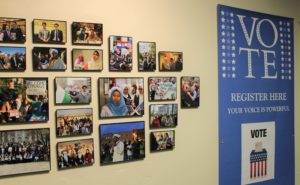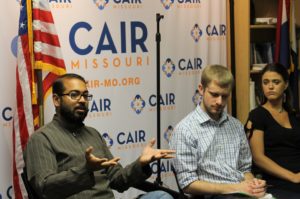Last month in Missouri, I met Faizan Syed, Executive Director of the Council on American-Islamic Relations (CAIR-MO). It was one year to the day since violent clashes at a white supremacist gathering in Charlottesville, Virginia saw three people killed and dozens injured. President Donald Trump never really did seem to condemn the white nationalists and neo-Nazi protesters, putting them in the same “bad people” category as the anti-fascists who turned out to counter the demonstration.
The purpose of my travels across the US this summer was to explore American values: what are they, where do they sit in the age of Trump? From CAIR, the nation’s largest Muslim civil rights and advocacy organisation, I wanted to hear the perspective of a minority group increasingly under attack – most notably, it seems, from their nation’s Commander-in-Chief.
Faizan’s perception of his country wasn’t unlike that of any other American you’d expect to meet: truly great, a place where people can come from all over the world and make a life for themselves. Despite this, he continued, it has often struggled to realise its values: ask African-Americans who lived under slavery and Jim Crow laws; or the Japanese interned during World War Two; or Jews returned to Germany at the time of the Holocaust. Yet as groups have faced discrimination, said Faizan, they’ve gathered together to remind the US of its values; the fight for Muslims is the new civil rights movement and CAIR is on the front line.
Hate crime against Muslims skyrocketed in the US after 9/11 – understandable, said Faizan, given the media hysteria at the time. This fell away soon after, but things started to change in 2008. A rise of anti-Muslim rhetoric coincided with the election of Barack Obama – accused by some of his opponents of being a Muslim – then the economic crash and emergence of the Tea Party.
In 2010, plans to build a 15-storey mosque and cultural centre – Park51 – near Ground Zero in Manhattan erupted into a national controversy, dubbed a ‘victory mosque’ by critics. Then came the anti-Sharia movement, with states like Oklahoma forbidding courts from considering Sharia law in their decisions, despite less than 10% of the US population being Muslim and many until this point not even having heard of Sharia law. In April, CAIR’s 2018 Civil Rights Report showed that President Trump’s Muslim Ban has sparked a 17 per cent increase in anti-Muslim bias incidents across the US.
So long as hatred and fear of the “other” is used as a political tool it won’t go away, said Faizan. CAIR aims to tackle the misperceptions, the mainstreaming of anti-Muslim and anti-refugee rhetoric, which has been particularly prominent throughout the Syrian civil war.
Did you know that there are more Bosnians per capita in St. Louis, Missouri than anywhere outside Bosnia? Having been relocated during the 1990s Balkan conflict, they helped revitalise the south of the city. Couldn’t this have been replicated during the Syrian conflict to revitalise other parts of the area? Of course, but given the political context this didn’t happen – in April the International Rescue Committee reported that just 44 Syrian refugees were admitted to the US during in the first six months of the fiscal year – representing a 99 percent decline from the 5,839 admitted in the same period last year.
Whilst CAIR seeks to educate people about Islam, they acknowledge that there are global forces and trends to contend with – it’s up to them to call displacement out as just that, support refugees in their resettlement and work with the community to reflect America’s true ideals.
Northern Ireland has not been immune to global forces either – we have our own ‘racism problem’. Over the past two years PSNI figures have shown that racially-motivated crimes have exceeded those connected to traditional sectarianism. In June of this year the Northern Ireland Life and Times Survey revealed that over half of the population would not willingly accept a Muslim or an Irish Traveller as a relative through marriage.
Politicians of our plateaued peace process may not openly stir tensions but the absence of decision-making at Stormont and an Executive to lead on tackling intolerance allows a certain vacuum to flourish.
A year on from Charlottesville, former President Barack Obama went some way to sum up the American values which CAIR still believes in: “We’re supposed to stand up to bullies… up to discrimination… How hard can that be, to say that Nazis are bad?”
Leaving Missouri, I wondered, twenty years on from the Good Friday Agreement are we any closer to agreeing a concept of shared values even if we can’t find consensus on a shared future?
Catch up with Connor Daly’s dispatches from his US trip here:
Lessons from the state where young people don’t want to stay
Our dead should rest with dignity. Could an Arlington model work?


Also published on Medium.
